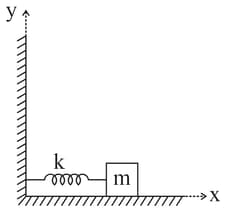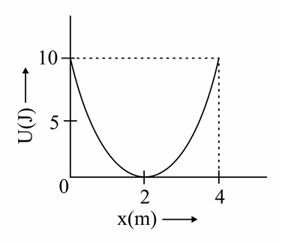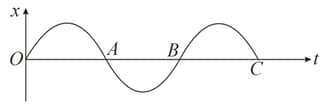A simple harmonic oscillator has amplitude angular frequency and mass . Then average kinetic energy in one time period is
Important Questions on Simple Harmonic Motion
An object of mass is attached to a spring which is fixed at one end on a rigid support and the mass-spring system is kept on a frictionless table. The object is allowed to execute simple harmonic motion along - direction. The force constant of the spring is and the spring is stretched initially a distance of , the total energy stored in the system is

A body of mass is executing simple harmonic motion. Its displacement at seconds is given by . Its maximum kinetic energy is
Total energy of a particle performing S.H.M. is NOT proportional to
A mass of is connected to a spring. The potential energy curve of the simple harmonic motion executed by the system is shown in the figure. A simple pendulum of length has the same period of oscillation as the spring system. What is the value of acceleration due to gravity on the planet where these experiments are performed ?

The variation of displacement with time of a particle executing free simple harmonic motion is shown in the figure.

The potential energy versus time plot of the particle is correctly shown in figure:
(a) Potential energy is always equal to its
(b) Average potential and kinetic energy over any given time interval are always equal.
(c) Sum of the kinetic and potential energy at any point of time is constant.
(d) Average in one time period is equal to average potential energy in one time period.
Choose the most appropriate option from the options given below :

